Russia, Belarus Winter Paralympic athletes banned from competing in Beijing in amazing backflip
Less than 24 hours after being given the all clear to compete, Russian and Belarusian athletes have now been kicked out of the Winter Paralympics in Beijing after a public and private outcry.
Other Sports
Don't miss out on the headlines from Other Sports. Followed categories will be added to My News.
International Paralympics Committee president Andrew Parsons has declared “the war has now come” to the 2022 Winter Paralympics in Beijing as he and the IPC face significant backlash for their handling of the Russian and Belarussian Paralympic Committees’ involvement in the Games.
The IPC governing board convened on Thursday and sensationally chose to backflip on its decision made only 14 hours earlier to allow the Russian Paralympic Committee and NPC Belarus to compete in Beijing.
Parsons defended the IPC governing board’s previous decision, saying in the 14 hours since the announcement a “significant number” of National Paralympic Committees, teams and athletes had threatened to boycott the Games if RPC and NPC Belarus were allowed to compete.
Stream Over 50 Sports Live & On-Demand with Kayo. New to Kayo? Try 14-Days Free Now >
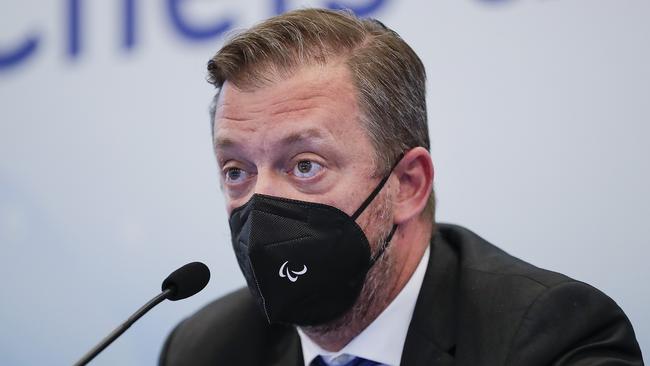
“It was a significant number that made us take the decision that we are taking here, to make sure the Games are viable and preserve the experience for the 600 athletes that are still competing here,” Parsons said.
“I don’t think we underestimated (the backlash). What we tried to do with the previous decision was stick to the values and principles of the organisation and keep war outside of these games.
“The war was brought to these games and the situation has escalated. I don’t think we underestimated (the backlash).”
IPC chief of communications Craig Spence said the situation had rapidly escalated since the original decision, with multiple NPCs, teams and athletes threatening to boycott the Games.
“When you have governments behind the scenes speaking to the Paralympic committees and threatening to withdraw from the Games … it snowballs and then the Games aren’t viable, and the opening ceremony is (in 24 hours time).”
A statement released by the IPC on Thursday afternoon (EDT) referenced the situation within the athlete villages had become “untenable”. Parsons said there had been no physical confrontations within the villages, however the threat of a boycott from multiple NPCs proved too great to ignore.
“There was a level of animosity which is counterproductive to what we want to have here, which is fair competition between different athletes from different nations,” he said.
Asked why the IPC had backflipped on its decision less than 24 hours later, Spence said the change in tone from competing NPCs, teams and athletes had forced the governing board’s hand.
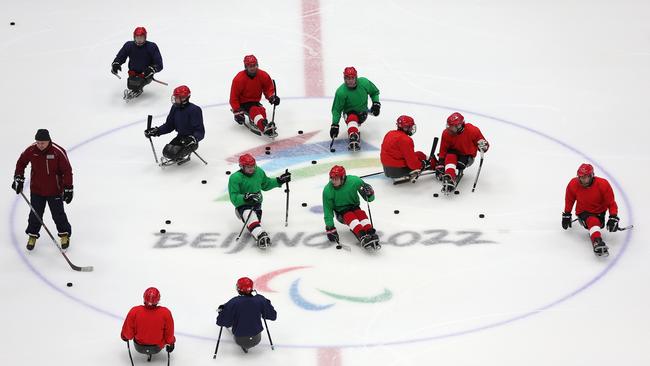
“In the build-up to our (original) decision we spoke to athletes and we were getting letters from Paralympic Committees giving us a view on what they believed the IPC should do. What we’ve seen in the 14 hours since is a move from letters of ‘we think you should ban’ to now ‘we’re thinking of going home’,” Spence said.
“That threatens the viability of this event – that is a huge change. If we don’t act on that, we’re crazy, so we have, and we’ve made again a decision based on the fact of the position of our NPCs has gone from a recommendation to a threat, almost.
“The tensions are building in the village. It’s better to act now than wait until something happens.
“That’s why we have to act on that, we have to listen, otherwise we go against the core values and principles the IPC is based on.”
In the IPC’s first statement on Wednesday night, it cited likely legal red tape that limited its ability to ban Russia and Belarus from the Winter Paralympics.
Asked if the IPC now expects any legal ramifications as a result of the change in decision, Parsons said yes.
“We do believe that the Russian Paralympic Committee and Belarus Paralympic Committee will take legal actions,” he said.
“Our legal assessment remains the same.”
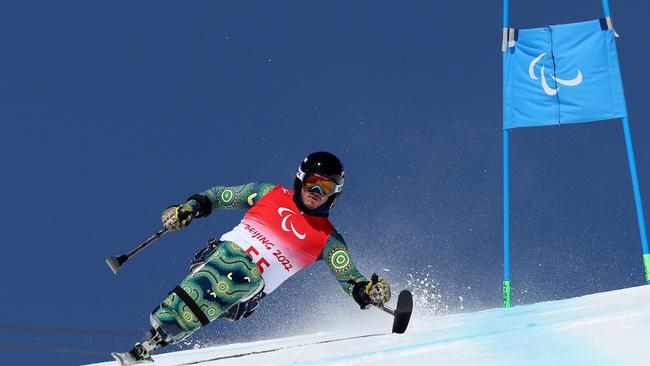
Meanwhile, Paralympics Australia president Jock O’Callaghan says the International Paralympic Committee’s decision is “the right one with the safety of all participants at its core”.
In a statement on Thursday Paralympics Australia endorsed the decision of the IPC to refuse entry to the Russian Paralympic Committee and National Paralympic Committee Belarus.
“This is the best decision to ensure that the integrity of the Beijing Paralympic Games is upheld to the best possible standards in these unprecedented times,” O’Callaghan said.
“We recognise that (this) situation does not give us the luxury to rely on the principle that ‘politics and sport should not mix’ when we are witnessing hostilities in Europe on this scale.”
World rages over ‘bulls**t’ Paralympics call
Russian and Belarusian athletes will be allowed to compete at the upcoming Beijing Winter Paralympic Games after questions were raised about their participation as the world reacts with alarm to Russia invading Ukraine.
The International Paralympic Committee said in a statement that the athletes will take part as neutrals and will compete under the Paralympic flag and not be included in the medal table.
“They will compete under the Paralympic flag and not be included in the medal table,” the IPC said.
President Andrew Parsons said it was a difficult time for the world and the Paralympic movement but he urged competitors to treat the “neutral athletes as they would any other athletes”.
“Unlike their respective governments these athletes and officials are not aggressors,” Parsons told reporters in Beijing.
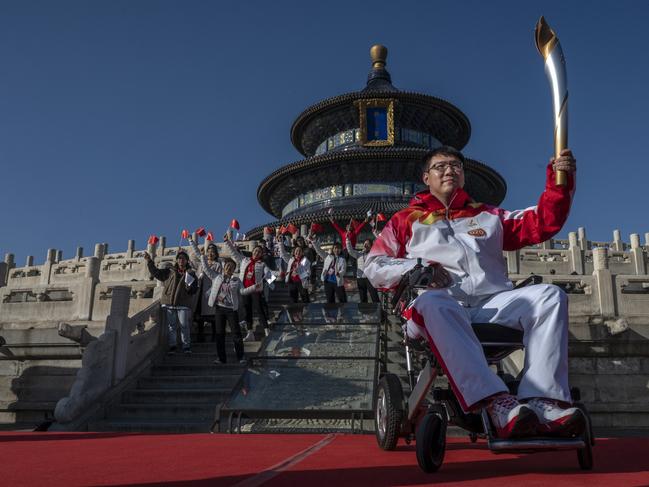
But Germany’s top Paralympic official said late Wednesday the decision lacked courage and called it “bullshit”.
“It’s a dark day for the Paralympic movement,” the country’s Paralympic Committee President Friedhelm Julius Beucher told AFP in China’s Zhangjiakou, which will host the cross-country skiing, biathlon and para-snowboard events.
Beucher said Ukrainian athletes at the Games would be phoning home each day asking loved ones, “are you still alive, are you okay?” Britain’s Culture Secretary Nadine Dorries also took a dim view of the decision.
“I am extremely disappointed in the IPC - this is the wrong decision and I call on them to urgently reconsider,” she said on Twitter.
“They must join the rest of the world in condemning this barbaric invasion by banning Russian and Belarusian athletes from competing.” But Parsons said the IPC’s decision “is the harshest possible punishment we can do within the framework of our rules”.
He added that the decision had not been unanimous within the committee but he would not disclose a breakdown of the voting.
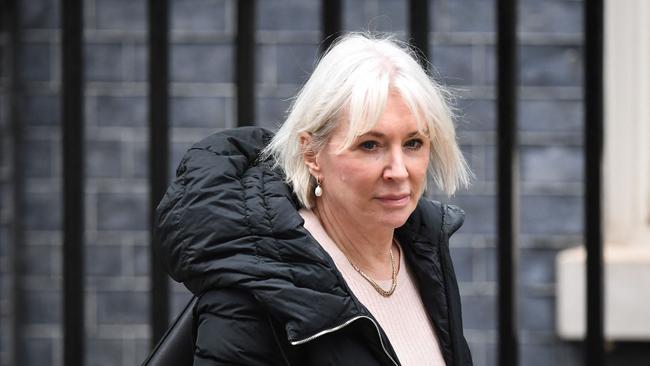
Earlier, Paralympics Australia joined the condemnation of Russia while calling into consideration the merits of Russian and Belarusian athletes’ participation at the Games.
“We support the International Paralympic Committee (IPC) in strongly condemning the actions taken by the Russian government in Ukraine. We stand united with the athletes and the other members of the Paralympics Family in Ukraine who have been impacted by these devastating events,” Paralympics Australia president Jock O’Callaghan said in a statement on Wednesday.
Meanwhile, Australian Olympic bosses have applauded the historic move to exclude Russian and Belarusian athletes from international sports events, vowing to join the global boycott after Vladimir Putin invaded Ukraine.
As far as Australian Olympic Committee chief executive Matt Carroll is concerned, Olympic powerbrokers ‘made the right call’ by booting the Russians out of world sports and stripping Putin of his Olympic awards.
For an organisation that has always preached political neutrality, the International Olympic Committee’s decision is a major break from tradition but Carroll said Australia was right behind the call.
“It wasn’t an easy decision because there’s a lot of things to balance,” Carroll said.
“They’ve called it a dilemma and I agree with them and our belief is they’ve fallen on the right side of the dilemma in this case.
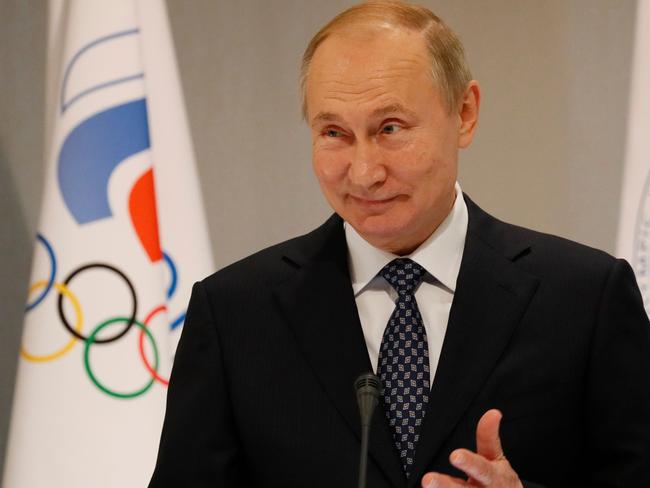
“The IOC has been honest in that they always try to keep sport away from politics, to try and keep it above politics so athletes from different countries can come to the Games and compete in peace.
“But at the same time, the fairness of athletes and the fairness of competition has to be balanced, hence the dilemma.
“So, is it letting the genie out of the bottle? It’s making a decision based on the circumstances that are front of us and I think they’ve made the right call.”
While Carroll is bullish that Australia is doing the right thing by supporting the international black-banning of Russian athletes and events on Russian soil, he said he was still waiting to see the full impact it will have on Australian sports.
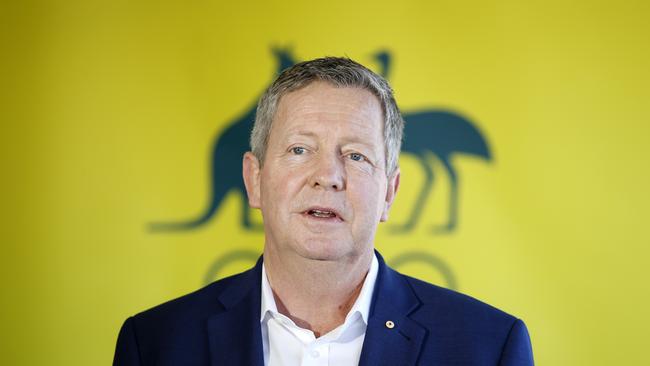
He said he had written to all sports under the Olympic umbrella and had already heard back from 20, which were mostly unaffected, such as badminton, or others whose international federations had taken matters out of their hands and already cancelled events in Russia.
This includes swimming’s world body FINA, which will announce further sanctions against Russia, including stripping Putin of a personal honour he received almost a decade ago.
Other sports are still figuring it out because the situation is complex. In figure skating, for example, several top Australians train in Moscow, while others are trained by Russian coaches in Australia, but Carroll said he does not expect they will be impacted by the bans.
“All the sports are very understanding of the position we’re taking,’ Carroll said.
“Most of the international federations are in a similar situation so it’s just up to us to pull that together and then sit down with the sports and see the effect it will have.
“In sports where the coaches are employed by individual athletes not necessarily by the sport, that may take a bit longer to come back to us.
“There are some Russian coaches in different sports and some of them are residents in Australia but that’s a totally different kettle of fish.
“Certainly all the sports are very supportive of the stance that we’ve adopted while supporting the IOC.”
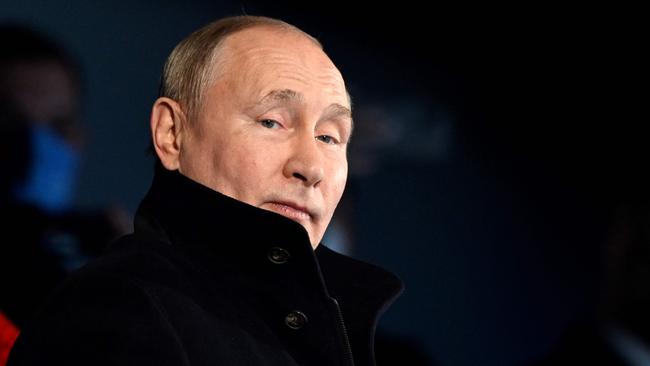
While the IOC seems to have taken a tough stance – recommending that all sports ban Russian and Belarusian athletes, along with their flags, anthems and national symbols, the cynics are not convinced much will change.
Russia has been banned from the Olympics since 2018 after being busted for state-sponsored doping but in name only, with individuals and teams allowed to compete under the acronym ROC – or Russian Olympic Committee – and there is still no firm decision on what will happen at the next Olympics in Paris in 2024.
“We’re jumping two and a bit years ahead there so I have no expectation about what’s going to happen,” Carroll said.
“As the IOC said, it’s a dilemma for the Olympic movement.
“Hopefully, in the near future, sooner rather than later, the conflict will cease and if that occurs then those athletes will be able to compete at the competition so there would no reason to exclude athletes from competition.”
‘Appalled’: Swimming powers turn on Russia
Swimming Australia has welcomed the decision by the sport’s embattled world governing body FINA to start removing major events from Russia after Vladimir Putin invaded Ukraine.
Following a weekend of high-level talks with key stakeholders, FINA has stripped Russia of the two world championships it was scheduled to host later this year and is in the process of choosing alternate host venues.
FINA said the junior world championships, which were due to be held in Kazan in August, would proceed later this year in a different country, with talks already well advanced with several potential candidates.
FINA is also looking for a new host nation for the short-course world championships, which were scheduled to take place in Russia in December, after announcing it “will not be holding any future events in Russia if this grave crisis continues.”
However, insiders involved in the weekend talks told News Corp it is too late to relocate this year’s full FINA world championships, which includes diving, water polo and artistic swimming, away from Budapest.
Although Hungary borders Ukraine and expects to be flooded by refugees fleeing the war in their neighbouring homeland, FINA executives are still holding out hope the world championships will proceed in June and July.
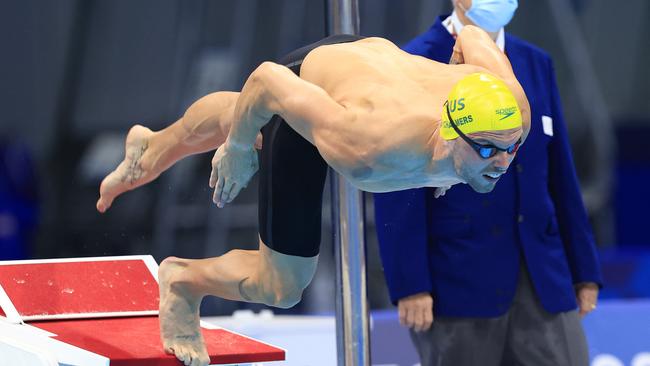
But if the war escalates and threatens the safety of participants in Budapest, they will be cancelled altogether as there’s just not enough time to find a fresh replacement.
Swimming’s major powerhouses were all notified about FINA’s plans over the weekend and are understood to be on board with the changes but are monitoring the escalating crisis.
Normally reluctant to speak out on hot political issues, Swimming Australia, to its credit, issued a strongly worded statement criticising Russia’s unprovoked attack on its eastern European neighbour, saying: “Swimming Australia strongly condemns the actions of the Russian Government and is appalled by the developments in Ukraine.”
Both Australia and the United States – swimming’s two most successful nations – have long-serving influential representatives on FINA’s executive board and it is understood they were kept up to date with the looming event changes during a series of hook-ups between global swimming decision makers over the weekend.
More than a dozen countries had already publicly threatened to boycott swimming events in Russia because of concerns about athlete safety but the tide began to turn once the International Olympic Committee (IOC) called on federations to take events away from Russia and swimming’s biggest players indicated they were prepared to join in the boycott.
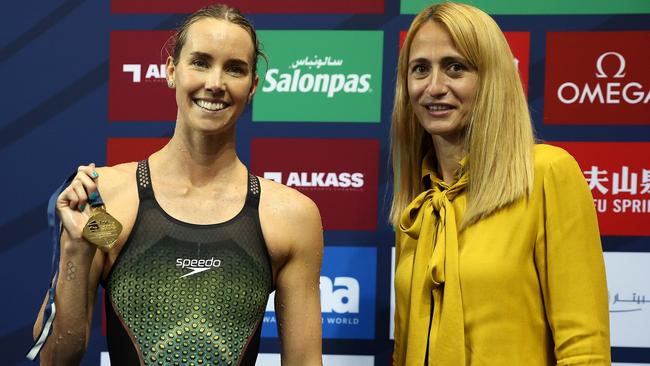
“The decision has been made with athlete and staff safety the priority, whilst also acknowledging the role that sports must play within the international landscape,” Swimming Australia said.
Swimming Australia has pulled out of world championships before, withdrawing from two events last year because of concerns about Covid, but this represents a new watershed moment for an organisation and a sport that has previously been reluctant to cause any ripples.
Criticised for being slow off the mark while other sporting federations and their member nations were already cancelling events in Russia, swimming’s better late than never stance against Russia’s aggression is the right thing to do.
Swimming authorities deserve high praise for finally standing up to Putin after years of cosying up to the sports-mad Russian dictator and accepting the huge amounts of money he has ploughed into the sport
Putin was presented with FINA’s highest individual honour after he agreed to foot the bill for the 2015 world championship even though human rights groups warned the international swimming community it was legitimising Putin’s leadership through ‘sports washing’.
It is no surprise that Russia has subsequently been handed a stream of world championships in the years since, including the two scheduled for later this year and the 2025 world championships, but that could all be over.
Poland refuses to play Russia in World Cup
Russia is about to be wiped from the international sporting map.
Good riddance — because it can’t happen soon enough.
Already, leading sporting federations around the world, including football and Formula One, have taken strong and decisive action by cutting ties with Russia after Vladimir Putin invaded Ukraine.
On Saturday, AFP reported the president of the Polish football federation said Poland will not play their 2022 World Cup playoff with Russia in Moscow on March 24 due to the conflict.
“The time for talking is over. It is time to act. Due to the escalation of the Russian Federation’s aggression in Ukraine, the Polish team does not envisage playing the playoff against Russia,” wrote Cezary Kulesza, adding it was the “only correct decision”.
He said he would work with the Swedish and Czech federations — the winners of their match would have to play in Russia (on March 29) if the latter beat Poland — to present a unified position to FIFA.
The three federations issued a joint statement on Thursday demanding FIFA move the respective play-offs from Russia, who only four years ago hosted the World Cup finals.
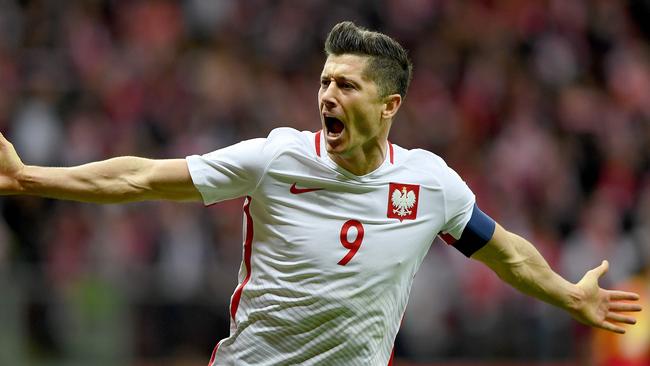
Polish captain Robert Lewandowski, who had tweeted on Friday he would consult his teammates about the match, welcomed his federation’s move.
“The right decision!” tweeted Bayern Munich’s star striker. “I cannot imagine playing a match with the Russian national team in a situation when armed aggression in Ukraine continues.
“Russian footballers and fans are not responsible for this, but we cannot pretend that nothing is happening.”
On Friday the 33-year-old had expressed his rejection of war.
“Everything which is beautiful in sports is against what war brings,” he said. “For all people who value freedom and peace this is a time of solidarity with the victims of the military aggression in Ukraine.”
Now, the few remaining stragglers who still haven’t figured out which side of history they want to be on have been given a shrift boot up the backside and told to do the right thing.
This includes Australia’s favourite Olympic sport of swimming, whose out-of-touch leaders have been pandering to Putin for years, aiding his shameless attempts to legitimise his brutal rule through “sportswashing”.




